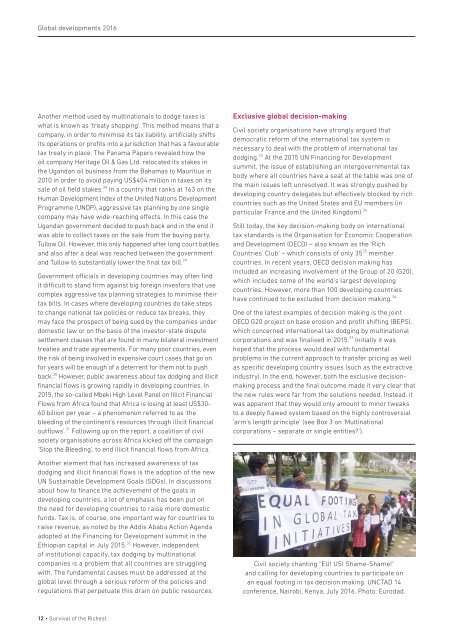You also want an ePaper? Increase the reach of your titles
YUMPU automatically turns print PDFs into web optimized ePapers that Google loves.
Global developments 2016<br />
Ano<strong>the</strong>r method used by multinationals to dodge taxes is<br />
what is known as ‘treaty shopping’. This method means that a<br />
company, in order to minimise its tax liability, artificially shifts<br />
its operations or pr<strong>of</strong>its into a jurisdiction that has a favourable<br />
tax treaty in place. The Panama Papers revealed how <strong>the</strong><br />
oil company Heritage Oil & Gas Ltd. relocated its stakes in<br />
<strong>the</strong> Ugandan oil business from <strong>the</strong> Bahamas to Mauritius in<br />
2010 in order to avoid paying US$404 million in taxes on its<br />
sale <strong>of</strong> oil field stakes. 28 In a country that ranks at 163 on <strong>the</strong><br />
Human Development Index <strong>of</strong> <strong>the</strong> United Nations Development<br />
Programme (UNDP), aggressive tax planning by one single<br />
company may have wide-reaching effects. In this case <strong>the</strong><br />
Ugandan government decided to push back and in <strong>the</strong> end it<br />
was able to collect taxes on <strong>the</strong> sale from <strong>the</strong> buying party,<br />
Tullow Oil. However, this only happened after long court battles<br />
and also after a deal was reached between <strong>the</strong> government<br />
and Tullow to substantially lower <strong>the</strong> final tax bill. 29<br />
Government <strong>of</strong>ficials in developing countries may <strong>of</strong>ten find<br />
it difficult to stand firm against big foreign investors that use<br />
complex aggressive tax planning strategies to minimise <strong>the</strong>ir<br />
tax bills. In cases where developing countries do take steps<br />
to change national tax policies or reduce tax breaks, <strong>the</strong>y<br />
may face <strong>the</strong> prospect <strong>of</strong> being sued by <strong>the</strong> companies under<br />
domestic law or on <strong>the</strong> basis <strong>of</strong> <strong>the</strong> investor-state dispute<br />
settlement clauses that are found in many bilateral investment<br />
treaties and trade agreements. For many poor countries, even<br />
<strong>the</strong> risk <strong>of</strong> being involved in expensive court cases that go on<br />
for years will be enough <strong>of</strong> a deterrent for <strong>the</strong>m not to push<br />
back. 30 However, public awareness about tax dodging and illicit<br />
financial flows is growing rapidly in developing countries. In<br />
2015, <strong>the</strong> so-called Mbeki High Level Panel on Illicit Financial<br />
Flows from Africa found that Africa is losing at least US$30-<br />
60 billion per year – a phenomenon referred to as ‘<strong>the</strong><br />
bleeding <strong>of</strong> <strong>the</strong> continent’s resources through illicit financial<br />
outflows’. 31 Following up on <strong>the</strong> report, a coalition <strong>of</strong> civil<br />
society organisations across Africa kicked <strong>of</strong>f <strong>the</strong> campaign<br />
‘Stop <strong>the</strong> Bleeding’, to end illicit financial flows from Africa.<br />
Ano<strong>the</strong>r element that has increased awareness <strong>of</strong> tax<br />
dodging and illicit financial flows is <strong>the</strong> adoption <strong>of</strong> <strong>the</strong> new<br />
UN Sustainable Development Goals (SDGs). In discussions<br />
about how to finance <strong>the</strong> achievement <strong>of</strong> <strong>the</strong> goals in<br />
developing countries, a lot <strong>of</strong> emphasis has been put on<br />
<strong>the</strong> need for developing countries to raise more domestic<br />
funds. Tax is, <strong>of</strong> course, one important way for countries to<br />
raise revenue, as noted by <strong>the</strong> Addis Ababa Action Agenda<br />
adopted at <strong>the</strong> Financing for Development summit in <strong>the</strong><br />
Ethiopian capital in July 2015. 32 However, independent<br />
<strong>of</strong> institutional capacity, tax dodging by multinational<br />
companies is a problem that all countries are struggling<br />
with. The fundamental causes must be addressed at <strong>the</strong><br />
global level through a serious reform <strong>of</strong> <strong>the</strong> policies and<br />
regulations that perpetuate this drain on public resources.<br />
Exclusive global decision-making<br />
Civil society organisations have strongly argued that<br />
democratic reform <strong>of</strong> <strong>the</strong> international tax system is<br />
necessary to deal with <strong>the</strong> problem <strong>of</strong> international tax<br />
dodging. 33 At <strong>the</strong> 2015 UN Financing for Development<br />
summit, <strong>the</strong> issue <strong>of</strong> establishing an intergovernmental tax<br />
body where all countries have a seat at <strong>the</strong> table was one <strong>of</strong><br />
<strong>the</strong> main issues left unresolved. It was strongly pushed by<br />
developing country delegates but effectively blocked by rich<br />
countries such as <strong>the</strong> United States and EU members (in<br />
particular France and <strong>the</strong> United Kingdom). 34<br />
Still today, <strong>the</strong> key decision-making body on international<br />
tax standards is <strong>the</strong> Organisation for Economic Cooperation<br />
and Development (OECD) – also known as <strong>the</strong> ‘Rich<br />
Countries’ Club’ – which consists <strong>of</strong> only 35 35 member<br />
countries. In recent years, OECD decision making has<br />
included an increasing involvement <strong>of</strong> <strong>the</strong> Group <strong>of</strong> 20 (G20),<br />
which includes some <strong>of</strong> <strong>the</strong> world’s largest developing<br />
countries. However, more than 100 developing countries<br />
have continued to be excluded from decision making. 36<br />
One <strong>of</strong> <strong>the</strong> latest examples <strong>of</strong> decision making is <strong>the</strong> joint<br />
OECD G20 project on base erosion and pr<strong>of</strong>it shifting (BEPS),<br />
which concerned international tax dodging by multinational<br />
corporations and was finalised in 2015. 37 Initially it was<br />
hoped that <strong>the</strong> process would deal with fundamental<br />
problems in <strong>the</strong> current approach to transfer pricing as well<br />
as specific developing country issues (such as <strong>the</strong> extractive<br />
industry). In <strong>the</strong> end, however, both <strong>the</strong> exclusive decisionmaking<br />
process and <strong>the</strong> final outcome made it very clear that<br />
<strong>the</strong> new rules were far from <strong>the</strong> solutions needed. Instead, it<br />
was apparent that <strong>the</strong>y would only amount to minor tweaks<br />
to a deeply flawed system based on <strong>the</strong> highly controversial<br />
‘arm’s length principle’ (see Box 3 on 'Multinational<br />
corporations – separate or single entities?').<br />
Civil society chanting "EU! US! Shame-Shame!"<br />
and calling for developing countries to participate on<br />
an equal footing in tax decision making. UNCTAD 14<br />
conference, Nairobi, Kenya, July 2016. Photo: Eurodad.<br />
12 • <strong>Survival</strong> <strong>of</strong> <strong>the</strong> <strong>Richest</strong>


